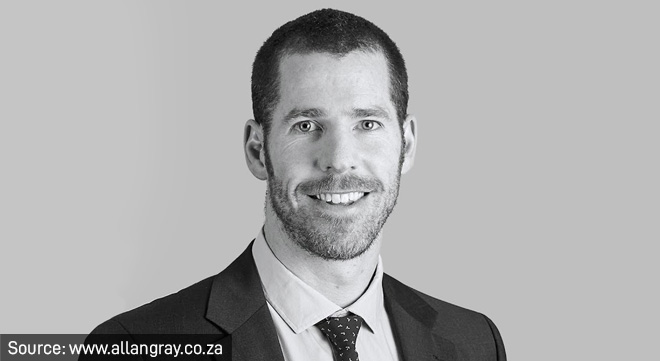There are numerous attractively valued companies on the JSE, which is far cheaper than it was a decade ago, says one of the managers of Allan Gray’s Equity Fund.
Many investors are wondering whether the exchange still holds any long-term value after a disappointing 10 years.
“It has not just been a lost quarter or year; the JSE has been a poor place to invest for more than a decade”, said Rory Kutisker-Jacobson (pictured).
He manages the Equity Fund with Duncan Artus, Jithen Pillay, and Tim Acker.
For every R100 you invested in the FTSE/JSE All Share Index (ALSI) at the end of December 2010, you would have about R360 (including dividends reinvested) today.
In US dollars, a $100 investment would be worth about $126 at the end of March 2024, given that the rand has weakened from R6.62 to R18.88 to the dollar over this time. Excluding dividends, in nominal terms, the value of this investment would be down in US dollars.
In contrast, a $100 investment in the United States’s major index, the S&P 500, in December 2010 would be worth roughly $539 at the end of March 2024 – more than four times the return experienced on the ALSI, Kutisker-Jacobson said in the Equity Fund’s latest commentary.
The Allan Gray Equity Fund returned 8% a year over the past 10 years, beating its benchmark by 1.8 percentage points, according to the fund’s fact sheet for March this year. CPI inflation averaged 5.1% over this period.
The fund’s benchmark is the market value-weighted average return of South African equity general unit trusts, excluding Allan Gray’s funds.
Last year, the ALSI returned 9.3% in rands, while the FTSE/JSE Capped SWIX All Share Index returned 7.9%. Although positive, Kutisker-Jacobson said one could have achieved a similar return from cash while taking on considerably less risk. The Allan Gray Money Market Fund generated a return of 8.4%.
The Equity Fund returned 12.4% in 2023, beating its benchmark’s return of 2.8%. Inflation averaged 5.6%.
To make matters worse, in the first three months of the year, markets have given back about a quarter of last year’s return, with the ALSI down 2.2% and the Capped SWIX down 2.3%.
There have been few places to hide, with 26 out of the top 40 stocks down in nominal terms, including dividends, in the first quarter of 2024, Kutisker-Jacobson said.
The Equity Fund returned 2.3% to the end of March this year.
The fund had a 44% allocation to offshore investments – one percentage point below the permitted maximum – at the end of March.
The bigger picture
Kutisker-Jacobson said the JSE’s performance should be seen in context.
First, most emerging markets have fared poorly over the past decade, and the JSE has performed largely in line with its peers. One hundred dollars invested in the MSCI Emerging Markets Index would be worth about $131 at the end of March 2024.
The past 13-plus years have been more a story of exceptional relative returns from US companies than anything else. The S&P 500’s returns have been roughly threefold greater than those of the UK’s FTSE All Share Index over this same period, Kutisker-Jacobson said.
Second, “starting prices matter”. At the end of December 2010, the ALSI was trading on 17.2 times earnings, while the S&P 500 traded on 14.7 times earnings. At the end of March 2024, the ALSI had derated to 13.1 times earnings, while the S&P 500 had rerated to 21.6 times earnings. Underlying earnings growth has been superior in the US, but this change in sentiment has had a big impact on returns over time. The ALSI has gone from trading at a premium to trading at a material discount to the S&P 500, Kutisker-Jacobson said.
Third, an increasingly large number of multinational companies on the JSE derive more than 80% of their revenue and income from markets outside South Africa. They may be listed in South Africa, but their fortunes are not tied to the domestic economy. This is the case for companies such as British American Tobacco (BAT), Naspers and Prosus, AB InBev, and Glencore.
BAT, AB InBev, Naspers and Prosus, and Glencore comprised the Equity Fund’s top four holdings at the end of March, at 4.7%, 4.2%, 4%, and 3.1%, respectively.
‘Compelling opportunities’
Despite the “lost decade”, and the difficult political and economic landscape, Allan Gray believes there are “compelling opportunities” on the JSE.
Kutisker-Jacobson cited the Equity Fund’s material positions in Mondi and Sappi as examples.
In 2023, Mondi’s earnings fell by about 45% as prices and volumes in corrugated packaging and uncoated fine paper came under cyclical pressure.
“In our opinion, earnings are depressed, and current industry pricing is unsustainable. In addition, Mondi has a number of organic projects under development that should see growth in volumes and an improvement in costs. Using what we believe to be conservative normal pricing assumptions, Mondi trades on less than nine times our estimate of normal earnings,” Kutisker-Jacobson said.
Mondi is among the fund’s top 10 holdings, at 2.4%.
He said Sappi is a lower-quality company than Mondi but also considerably cheaper. At the end of September 2018, the share price was R88.75. At the end of the quarter, some five-and-a-half years later, it was 43% lower at R50.29 per share.
“Over this period, Sappi’s earnings have been cyclical, but it has grown free cash flow and reduced net debt by roughly a third. Similar to Mondi, we think earnings are depressed at current levels and are likely to rise in the future. However, even if earnings do not recover, Sappi is cheap. It trades at less than seven times consensus earnings for 2024,” Kutisker-Jacobson said.



